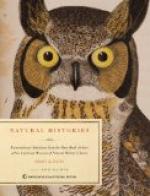The recently published experiments of Sir John Lubbock show that ants under certain circumstances are both stupid and devoid of any intelligent comprehension in the way of surmounting difficulties; but this distinguished observer has also shown that as regards communication between ants, and in the regulation of the ordinary circumstances of their lives, these insects evince a high degree of intelligence, and exhibit instincts of a very highly developed kind. Still, making every allowance for the development of extraordinary mental power in some species of ants, there can be little doubt of the purely automatic beginnings and nature of most, if not all, of the acts of ordinary ant existence. The young ant, wasp, or bee, will begin its labors and discharge them as perfectly at the beginning of its existence as a perfect insect, as at the close of life. Here there is no experience, no tuition, no consciousness, no reason, and no powers save such as have been transferred to the insect as a mere matter of heredity and derivation from its ancestors, who lived by an unconscious rule of thumb, so to speak. It is very hard at first to convince one’s self, when watching an ant’s nest, that intelligence and consciousness play little or no part in the apparently intelligent operation of these insects. But to assume the contrary would be to maintain that the insect stands on an equal footing to man himself, and for such a supposition there is neither lawful ground nor sympathy. The marvellous instinct of lower life stands on a platform of its own, has its own phases of development, and probably its own unconscious way of progress. The higher reason and intellect of humanity similarly possesses its own peculiar standard, rate, and method of culture. A man may seek and find in the ways of lower existence not merely a lesson in the ordering of his existence, but some comfort, also, in the thought that the progress of lower nature is not unknown in the domain of human hopes and aspirations.




